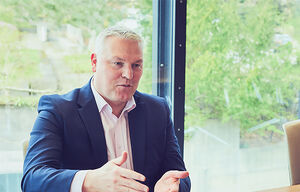Credit Suisse's Saudi Odyssey
Credit Suisse has been airing its ambitions for the oil monarchy for years now. Despite the bank’s good connections in the kingdom, there is little to suggest a breakthrough anytime soon.
Mohammed bin Salman was initially viewed as a ray of hope for reform. Appointed the kingdom's crown prince last year, he pledged to modernize the economy and society as well as weigh a listing for Saudi Aramco, which would have represented one the largest listings of all time.
Even before his appointment, bin Salman – MBS – drew headlines for his willingness to countenance reform. The economic liberalization of the country would make it an attractive opportunity for banks, given its enormous oil wealth.
Hope for Full License
Thus Credit Suisse would be looking to throw its hat into the ring. Two years ago Iqbal Khan, head of the bank’s international wealth management unit, said it would like to apply for a full bank license.
Nothing has changed since then. Credit Suisse, like rival UBS, already holds a license from the Capital Markets Authority, or CMA, in the kingdom. However a full license, which Credit Suisse needs from the Saudi Arabian Monetary Authority to realize its strategic ambitions, is still outstanding.
Clients Kept Waiting
Credit Suisse CEO Tidjane Thiam confirmed recently that such a license had been applied for, and he had spoken personally with the head of the authority. Still, there has been no movement on the application.
Clients too are waiting for progress on the management of their assets in the country. In Credit Suisse Saudi Arabia’s annual report last year, the bank said it is equipped to do business having set up an onshore platform.
Unattractive Offer
The lure of an local account with a Swiss bank is likely to be a hard sell: MBS has demonstrated he won't shirk messy methods to get his way. Last year: the influential crown prince locked up dozens of wealthy Saudis, including from his family, whom he viewed as undesirable. The men, all ultra-wealthy and influential, were held for months until they agreed to part with some of their funds.
Credit Suisse is rumored to have only actually booked one client's accounts locally – funds managed locally were modest. Until Credit Suisse can clinch a banking license, it has to work with a custodian bank locally. The Swiss bank's offering will be more attractive with its own license, but wealthy Saudis are still likely to prefer bringing a large part of their funds abroad for safekeeping.
Losses Widen
The Credit Suisse report also shows meager progress in Credit Suisse's investment in people and infrastructure. After the hiring push, the Saudi Arabian unit's loss deepened to more than 7 million Swiss francs ($7 million).
«Credit Suisse is further expanding and investing in its business in Saudi Arabia, a key growth market and of great importance to international wealth management,» the bank told finews.asia. «We consider the onshore private banking presence as a natural progression to further build our local footprint.»
Credit Suisse spared no effort, putting $600 million of balance sheet at the disposal of oil-rich potential clients for loans. For reference, this represented 1.4 percent of shareholder’s equity last year.
Aramco Ties
Besides foundering on the private banking side, Credit Suisse was also affected by the kingdom's pulling of the initial public offering for Saudi Aramco in August. Credit Suisse wasn't a prime candidate for the IPO mandate, but nevertheless sought to position itself: Huda Al Ghoson, the oil company's head of human resources, sits on the Swiss bank's local board.
Al Ghoson is one the kingdom's most influential women, outpacing in a ranking even Lubna Olayan, the matriarch of the wealthy Olayan family. The wealthy Saudi family has been major shareholders in Credit Suisse for more than 20 years.
Olayan head Aziz Syriani even sat on the bank’s board until 2013. Neither the weighty Saudia Arabian shareholder nor Credit Suisse’s more recent efforts could help the bank break through in the kingdom.




























